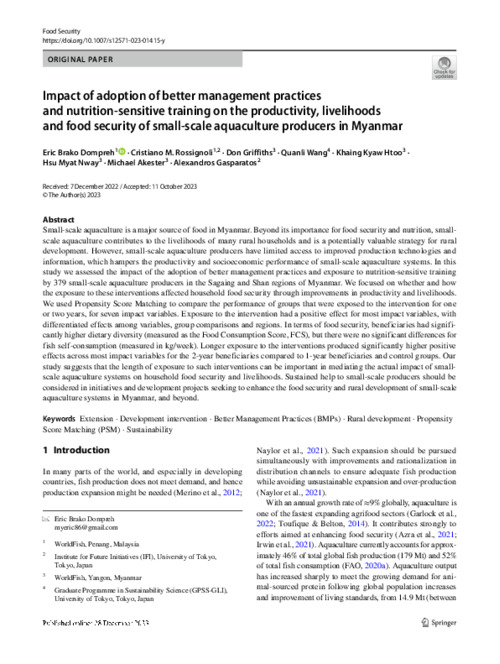Please use this identifier to cite or link to this item:
https://hdl.handle.net/20.500.12348/5748
Impact of adoption of better management practices and nutrition-sensitive training on the productivity, livelihoods and food security of small-scale aquaculture producers in Myanmar
| dc.creator | Brako Dompreh, E. | en_US |
| dc.creator | Rossignoli, C. | en_US |
| dc.creator | Griffiths, D. | en_US |
| dc.creator | Wang, Q. | en_US |
| dc.creator | Htoo, K. | en_US |
| dc.creator | Nway, H. | en_US |
| dc.creator | Akester, M.J. | en_US |
| dc.creator | Gasparatos, A. | en_US |
| dc.date.accessioned | 2024-01-09T21:24:31Z | |
| dc.date.available | 2024-01-09T21:24:31Z | |
| dc.date.issued | 2023 | en_US |
| dc.identifier.citation | Eric Brako Dompreh, Cristiano Rossignoli, Don Griffiths, Quanli Wang, Khaing Htoo, Hsu Myat Nway, Michael Akester, Alexandros Gasparatos. (28/12/2023). Impact of adoption of better management practices and nutrition-sensitive training on the productivity, livelihoods and food security of small-scale aquaculture producers in Myanmar. Food Security. | en_US |
| dc.identifier.issn | 1876-4517 | en_US |
| dc.identifier.issn | 1876-4525 | en_US |
| dc.identifier.uri | https://hdl.handle.net/20.500.12348/5748 | |
| dc.description.abstract | Small-scale aquaculture is a major source of food in Myanmar. Beyond its importance for food security and nutrition, small scale aquaculture contributes to the livelihoods of many rural households and is a potentially valuable strategy for rural development. However, small-scale aquaculture producers have limited access to improved production technologies and information, which hampers the productivity and socioeconomic performance of small-scale aquaculture systems. In this study we assessed the impact of the adoption of better management practices and exposure to nutrition-sensitive training by 379 small-scale aquaculture producers in the Sagaing and Shan regions of Myanmar. We focused on whether and how the exposure to these interventions affected household food security through improvements in productivity and livelihoods. We used Propensity Score Matching to compare the performance of groups that were exposed to the intervention for one or two years, for seven impact variables. Exposure to the intervention had a positive effect for most impact variables, with differentiated effects among variables, group comparisons and regions. In terms of food security, beneficiaries had significantly higher dietary diversity (measured as the Food Consumption Score, FCS), but there were no significant differences for fish self-consumption (measured in kg/week). Longer exposure to the interventions produced significantly higher positive effects across most impact variables for the 2-year beneficiaries compared to 1-year beneficiaries and control groups. Our study suggests that the length of exposure to such interventions can be important in mediating the actual impact of small-scale aquaculture systems on household food security and livelihoods. Sustained help to small-scale producers should be considered in initiatives and development projects seeking to enhance the food security and rural development of small-scale aquaculture systems in Myanmar, and beyond. | en_US |
| dc.format | en_US | |
| dc.language | en | en_US |
| dc.publisher | Springer (part of Springer Nature) | en_US |
| dc.rights | CC-BY-4.0 | en_US |
| dc.source | Food Security;(2023) | en_US |
| dc.subject | better management practices (bmps) | en_US |
| dc.subject | development intervention | en_US |
| dc.title | Impact of adoption of better management practices and nutrition-sensitive training on the productivity, livelihoods and food security of small-scale aquaculture producers in Myanmar | en_US |
| dc.type | Journal Article | en_US |
| cg.contributor.funder | European Union, European Commission | en_US |
| cg.contributor.funder | German Federal Ministry for Economic Cooperation and Development | en_US |
| cg.contributor.funder | CGIAR Trust Fund | en_US |
| cg.coverage.country | Myanmar | en_US |
| cg.coverage.region | South-Eastern Asia | en_US |
| cg.subject.agrovoc | sustainability | en_US |
| cg.subject.agrovoc | propensity score matching | en_US |
| cg.subject.agrovoc | rural development | en_US |
| cg.subject.agrovoc | extension | en_US |
| cg.subject.agrovoc | fish | en_US |
| cg.contributor.affiliation | Deutsche Gesellschaft für Internationale Zusammenarbeit | en_US |
| cg.contributor.affiliation | WorldFish | en_US |
| cg.contributor.affiliation | The University of Tokyo | en_US |
| cg.identifier.status | Open access | en_US |
| cg.identifier.ISIindexed | ISI indexed | en_US |
| cg.contribution.worldfishauthor | Brako Dompreh, E. | en_US |
| cg.contribution.worldfishauthor | Rossignoli, C. | en_US |
| cg.contribution.worldfishauthor | Griffiths, D. | en_US |
| cg.contribution.worldfishauthor | Htoo, K. | en_US |
| cg.contribution.worldfishauthor | Nway, H. | en_US |
| cg.contribution.worldfishauthor | Akester, M.J. | en_US |
| cg.description.theme | Resilient small-scale fisheries | en_US |
| dc.identifier.doi | https://dx.doi.org/10.1007/s12571-023-01415-y | en_US |
| cg.creator.id | Cristiano Rossignoli: 0000-0001-8220-7360 | en_US |
| cg.creator.id | Michael Joseph Akester: 0000-0001-6526-1613 | en_US |
| cg.subject.sdg | SDG 1 - No poverty | en_US |
| cg.subject.sdg | SDG 2 - Zero hunger | en_US |
| cg.subject.sdg | SDG 3 - Good health and well-being | en_US |
| cg.subject.sdg | SDG 10 - Reduced inequalities | en_US |
| cg.subject.sdg | SDG 11 - Sustainable cities and communities | en_US |
| cg.subject.sdg | SDG 12 - Responsible consumption and production | en_US |
| cg.subject.sdg | SDG 14 - Life below water | en_US |
| cg.subject.actionArea | Resilient Agrifood Systems | en_US |
| cg.subject.impactArea | Nutrition, health and food security | en_US |
| cg.subject.impactArea | Poverty reduction, livelihoods and jobs | en_US |
| cg.contributor.initiative | Aquatic Foods | en_US |
